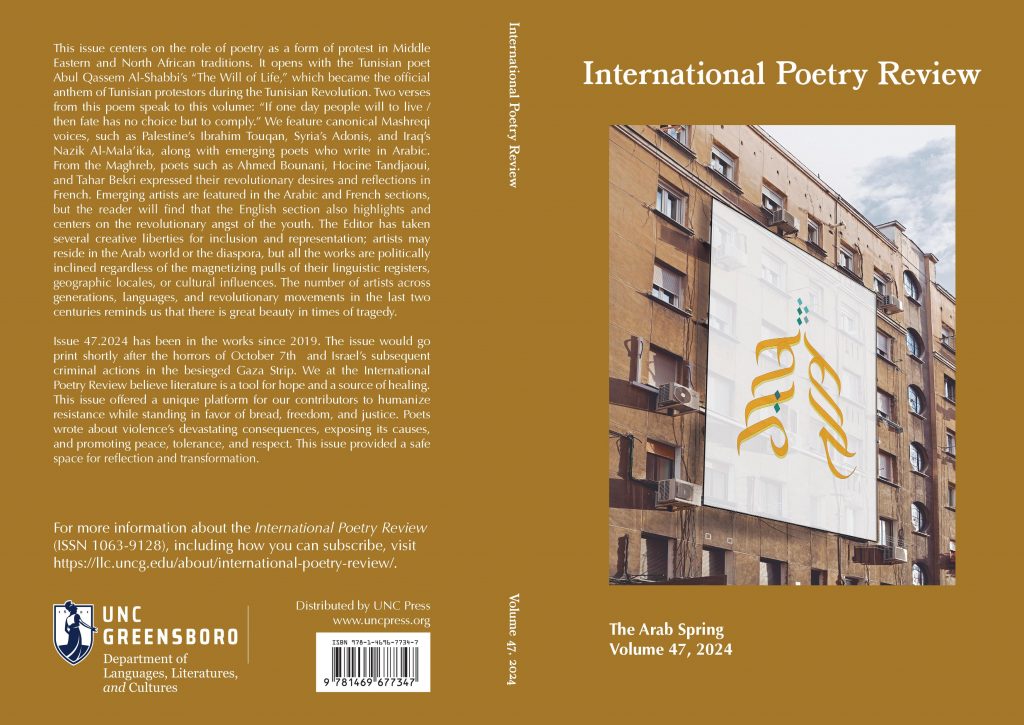Mission Statement
Founded in 1975 by Evalyn Pierpoint Gill, International Poetry Review is dedicated to the idea that the world becomes a better place when we listen to the voices of writers working in a variety of languages. The journal publishes works written by global contemporary writers in their own languages accompanied by facing English translations.
submission guidelines
International Poetry Review accepts previously unpublished poetry, fiction, literary nonfiction, and short essays. Works in translation will appear in a bilingual-facing format. We do not rigidly adhere to any one school of translation theory and welcome various styles.
To encourage younger authors, International Poetry Review dedicates a section to works written and/or translated by university students, both graduate and undergraduate and by recent graduates. Students in MFA programs are particularly invited to submit their work.
Please acquaint yourself with the following genre-specific and general guidelines.
Poetry. Please submit no more than 3 poems. Note that the journal size is 5 ½“ by 8 ¼” (not accounting for margin space), so lines longer than this must be wrapped. Please format your submission so that the original follows the translation for each poem.
Fiction. We accept micro and flash fiction of no more than 500 words.
Nonfiction. We accept literary nonfiction and short essays of no more than 1,000 words.
You may send all submissions as one Microsoft Word attachment (as a .docx) to rose.facchini@tufts.edu.
In your submission, please include the following:
- The original work(s) and the accompanying translation(s).
- A statement granting us permission to publish both the original work and the translation, and that you have the author’s permission to do so if you are the translator, or vice versa.
- Biographical notes for both author and translator(s), of no longer than 150 words each, written in the third person and beginning with the name.
- A note of no longer than 100 words that provides context for the poem and/or expresses any interesting challenges with the translation.
Important Notes:
- International Poetry Review claims first world print rights and we ask the author and translator to acknowledge IPR with any future reprints.
- We do not publish reprints. Translations (with the exception of their source texts), and original works in English must have not been previously published. This includes personal websites or blogs.
- We are not accepting submissions assisted in any way by AI writing tools such as ChatGPT.
- We welcome simultaneous submissions, but kindly inform us immediately if your work has been accepted elsewhere.
- Individuals will be informed of decisions to publish within three to four months after submission.
- The submission deadline for IPR Volume 48, slated to appear in spring 2025, is September 1, 2024.
We look forward to reading your work!
Subscriptions and Support
IPR does not charge a submission fee, but cannot subsidize the printing and mailing of copies for its contributors. We apologize for the inconvenience. This journal is a nonprofit that relies entirely upon reader support. If you value our work, please consider purchasing your copy.
The rate for 2023 will be $18 for individuals and $22 for institutions for one issue (please add $12 shipping for non-U.S. addresses). Checks should be made out to International Poetry Review and sent to the following address:
International Poetry Review
Department of Languages, Literatures, and Cultures
The University of North Carolina at Greensboro
2324 MHRA Bldg. PO Box 26170
Greensboro, NC 27402-6170
Institutions, please subscribe through EBSCO.
International Poetry Review can also be purchased on demand in Amazon.
INTERNATIONAL POETRY REVIEW 47.2024: the Arab spring
This issue centers on the role of poetry as a form of resistance in Middle Eastern and North African traditions. It opens with the Tunisian poet Abul Qassem Al-Shabbi’s “The Will of Life,” which became the official anthem of Tunisian protestors during the Tunisian Revolution. Two verses from this poem speak to this volume: “If one day people will live / then fate has no choice but to comply.” We feature canonical Mashreqi voices, such as Palestine’s Ibrahim Touqan, Syria’s Adonis, and Iraq’s Nazik Al-Mala’ika, along with emerging poets who write in Arabic. From the Maghreb, poets such as Ahmed Bounani, Hocine Tandjaoui, and Tahar Bekri expressed their revolutionary desires and reflections in French. Emerging artists are featured in the Arabic and French sections, but the reader will find that the English section also highlights and centers on the angst of the youth. The Editor has taken several creative liberties for inclusion and representation; artists may reside in the Arab world or the diaspora, but all the works are politically inclined regardless of the magnetizing pulls of their linguistic registers, geographic locales, or cultural influences. The number of artists across generations, languages, and resistance movements in the last two centuries reminds us that there is great beauty in times of tragedy.
Issue 47.2024 has been in the works since 2019. The issue would go print shortly after the horrors of October 7th and Israel’s subsequent criminal actions in the besieged Gaza Strip. We at the International Poetry Review believe literature is a tool for hope and a source of healing. This issue offered a unique platform for our contributors to humanize resistance while standing in favor of bread, freedom, and justice. Poets wrote about violence’s devastating consequences, exposing its causes and promoting peace, tolerance, and respect. This issue provided a safe space for reflection and transformation.
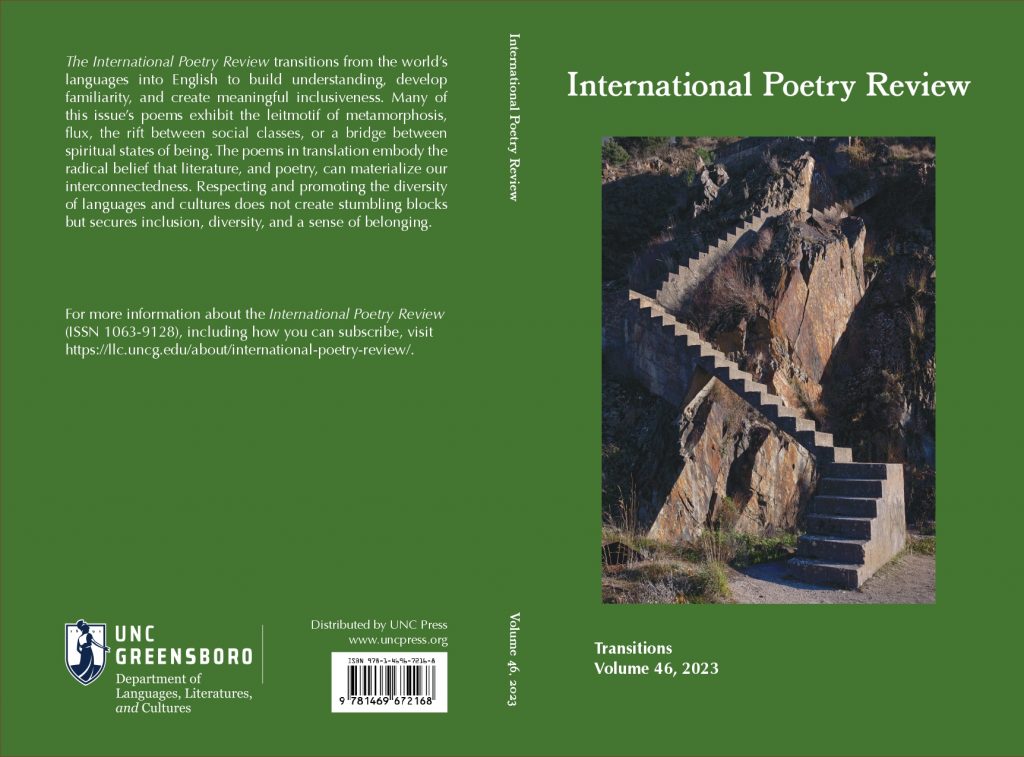
INTERNATIONAL POETRY REVIEW 46.2023: TRANSITIONS
Since 1973, through the art of translation and the visible relationship between the original and English-language versions, each issue of the International Poetry Review has been a form of transit. This vehicle carries the creativity of people speaking various languages into English to build understanding, develop familiarity, and create meaningful inclusiveness. Many of the poems in IPR 46.2023 exhibit the leitmotif of metamorphosis, flux, the rift between social classes, or a bridge between spiritual states of being.
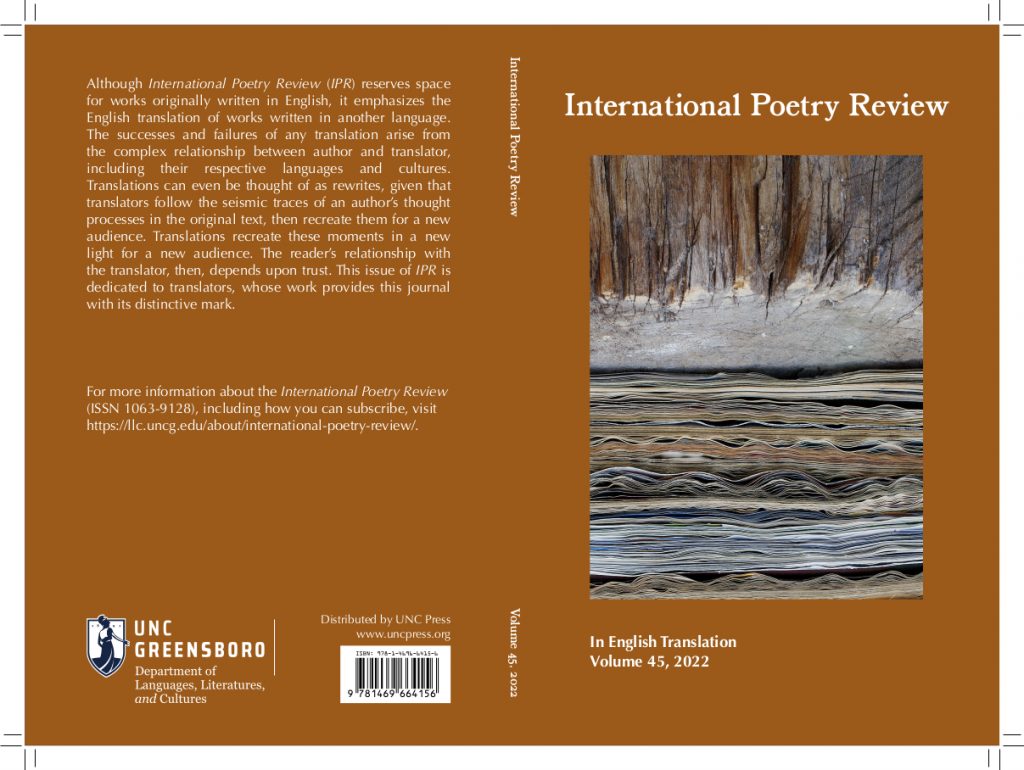
International Poetry Review 45.2022: In English Translation
Although International Poetry Review (IPR) reserves space for works originally written in English, it emphasizes the English translation of works written in another language. The successes and failures of any translation arise from the complex relationship between author and translator, including their respective languages and cultures. Translations can even be thought of as rewrites, given that translators follow the seismic traces of an author’s thought processes in the original text, then recreate them for a new audience. Translations recreate these moments in a new light for a new audience. The reader’s relationship with the translator, then, depends upon trust. This issue of IPR is dedicated to translators, whose work provides this journal with its distinctive mark.
Cover image © Chema Castelló / HereSea (detail) Papel Mojado Series, 2013
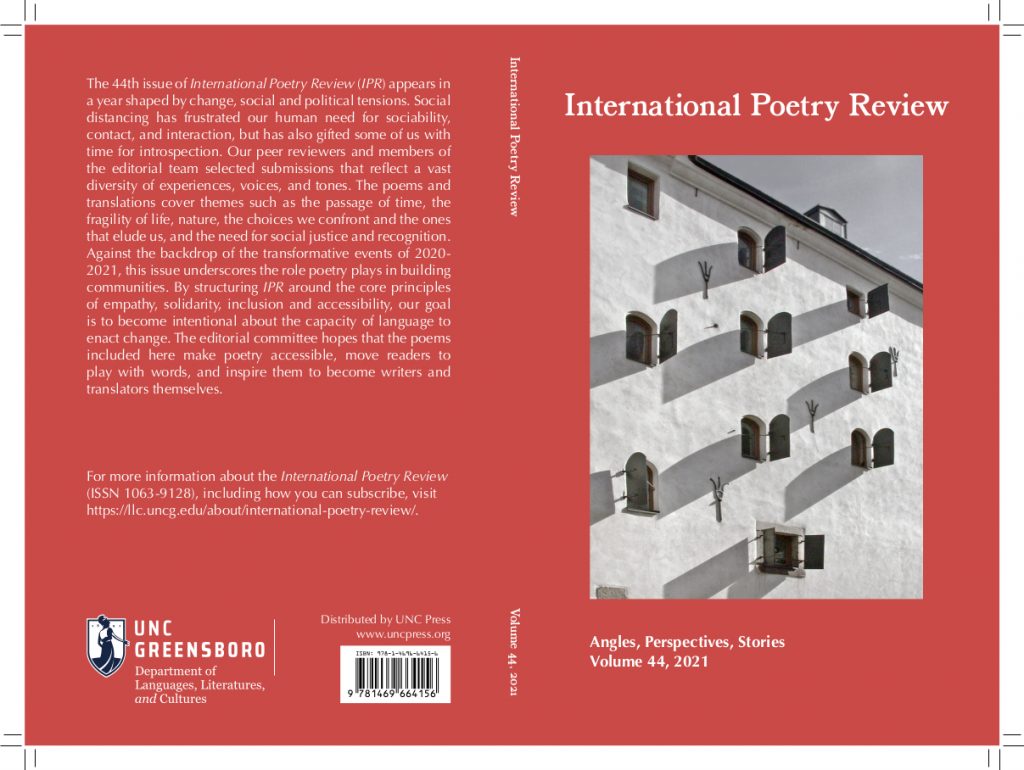
International Poetry Review 44.2021: Angles, Perspectives, Stories
The 44th issue of International Poetry Review (IPR) appears in a year shaped by change, social and political tensions. Against the backdrop of the transformative events of 2020-2021, this issue underscores the role poetry plays in building communities. By structuring IPR around the core principles of empathy, solidarity, inclusion and accessibility, our goal is to become intentional about the capacity of language to enact change. The editorial committee hopes that the poems included here make poetry accessible, move readers to play with words, and inspire them to become writers and translators themselves.
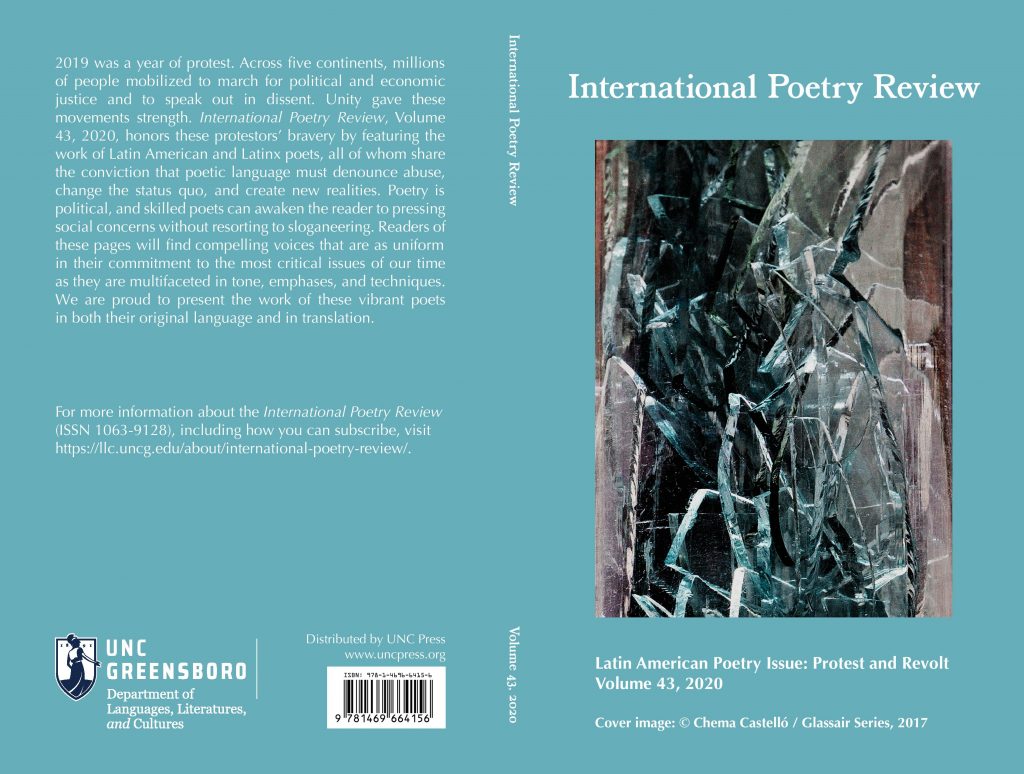
The Latin-American Poetry Issue 43.2020: Protest and Revolt
2019 was a year of protest. Across five continents, millions of people mobilized to march for political and economic justice and to speak out in dissent. International Poetry Review 43.2020 honors these protestors’ bravery by featuring the work of Latin American and Latinx poets, all of whom share the conviction that poetic language must denounce abuse, change the status quo, and create new realities. Poetry is political, and skilled poets can awaken the reader to pressing social concerns without resorting to sloganeering. Readers of these pages will find compelling voices that are as uniform in their commitment to the most critical issues of our time as they are multifaceted in tone, emphases and techniques. We are proud to present the work of these vibrant poets both in their original language and in translation.
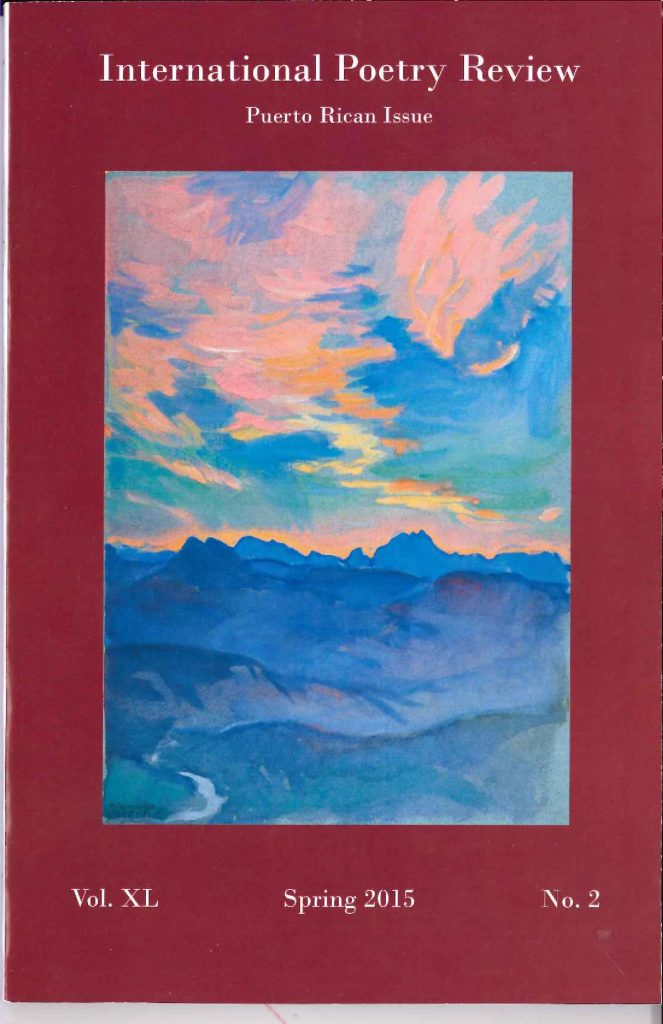
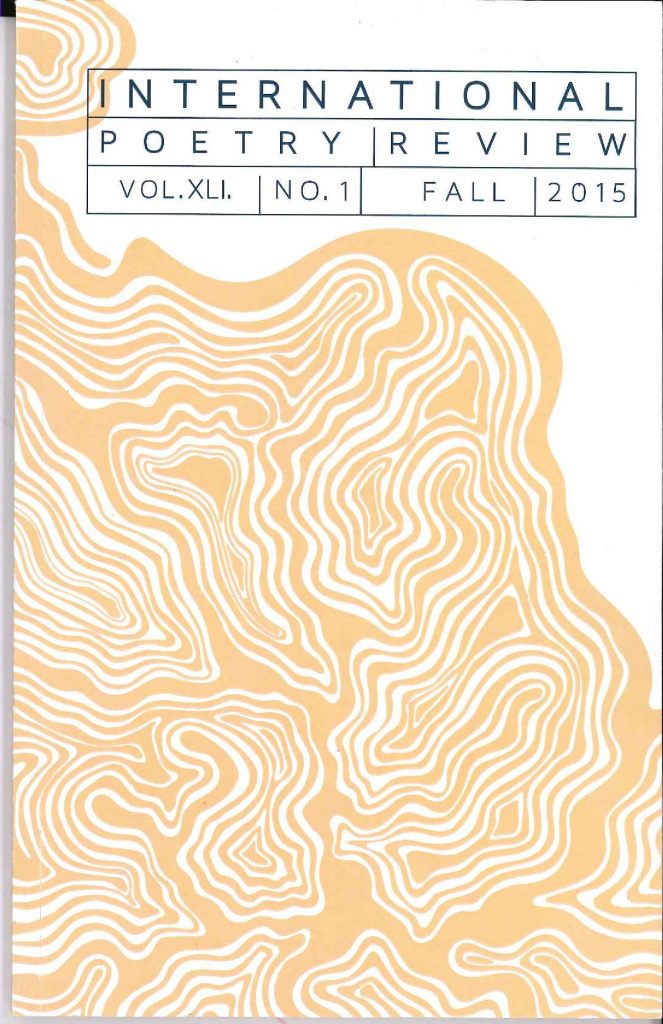
Editorial Team
Editors
Rose Facchini, Tufts U. Italian
Ana Hontanilla, UNC Greensboro. Spanish
Guest Editor of Italian Dossier
Rose Facchini, Tufts U.
Guest Editor in honor of Mark Smith-Soto
Mercer Bufter, UNC Greensboro
Translation Editors
Rose Facchini, Tufts U. Italian
Ana Hontanilla, UNC Greensboro. Spanish
Victor Pambuccian, Arizona State U. Romanian
Poetry Editors
Mercer Bufter, UNC Greensboro
Peter Dola, UNC Greensboro
Victor Pambuccian, Arizona State U. Romanian
Mark Smith-Soto, Emeritus, UNC Greensboro
Founding Editor
Evalyn Pierpoint Gill
Website Manager
Joshua Lunsford
International Poetry Review counts among its lifelong supporters the following poetry lovers:
Louis Bourne
Phil Cohen
Fred and Susan Chappell
Bernhard Frank
Alice Hill
Ruthie Katzenstein
Stevenson Lupton, Jr.
Karol Neufeld
David Schenck, Ph.D.
Maria H. Schilke
Dr. Alan E. Smith
David and Zita Smith
Mrs. Betty Watson

